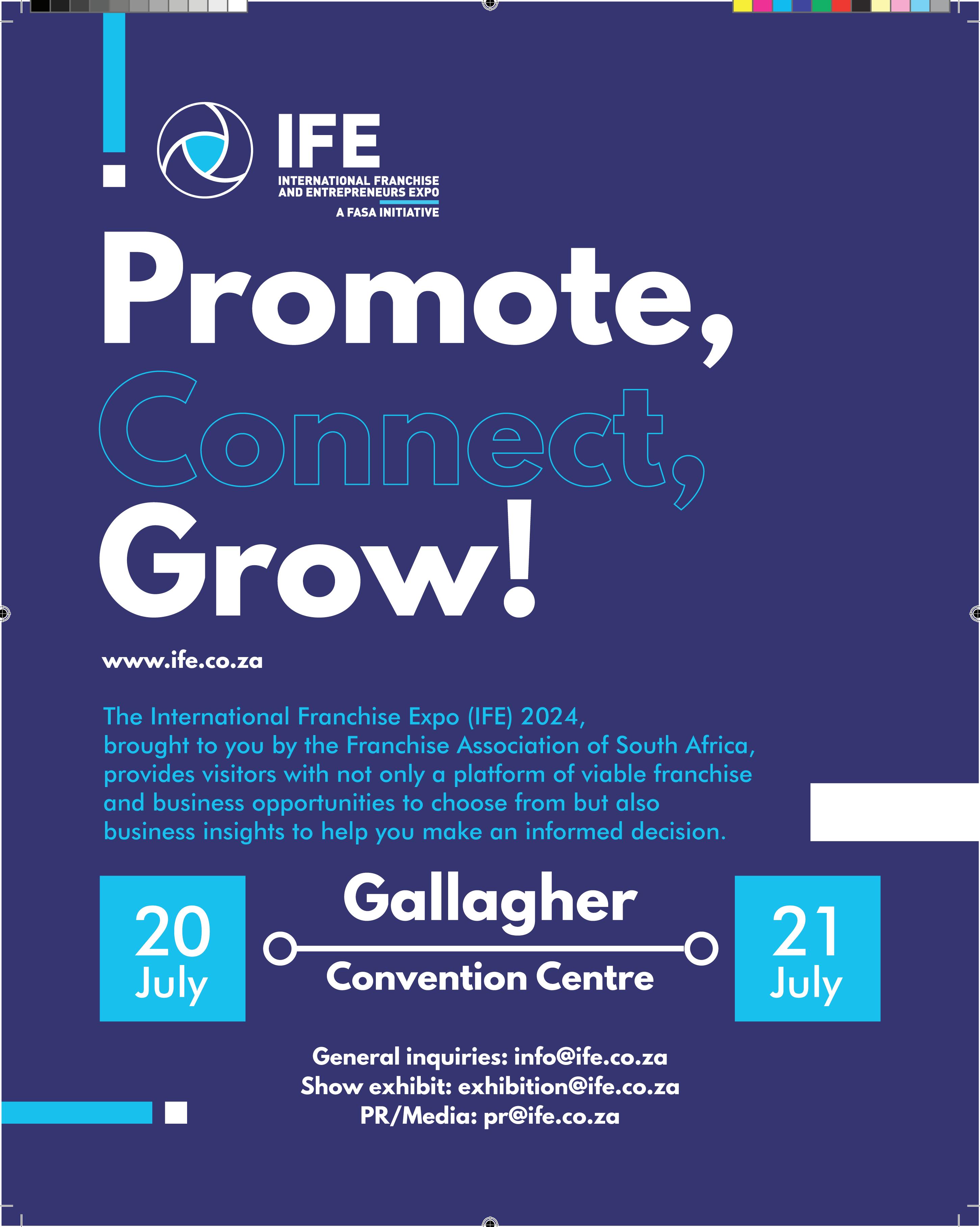


















PUBLISHED BY




















PUBLISHED BY
Picasso Headline,
A proud division of Arena Holdings (Pty) Ltd, Hill on Empire, 16 Empire Road (cnr Hillside Road), Parktown, Johannesburg, 2193
PO Box 12500, Mill Street, Cape Town, 8010 www.businessmediamags.co.za
EDITORIAL
Editor: Anthony Sharpe
Content Manager: Raina Julies rainaj@picasso.co.za
Contributors: Trevor Crighton, Caryn Gootkin, Karen Keylock, James Noble, Oresti Patricios
Copy Editor: Brenda Bryden
Content Co-ordinator: Natasha Maneveldt
Digital Editor: Stacey Visser vissers@businessmediamags.co.za
DESIGN
Head of Design: Jayne Macé-Ferguson
Senior Designer: Mfundo Archie Ndzo
Advert Designer: Bulelwa Sotashe
Cover Image: istockphoto.com, supplied

SALES
Project Manager: Gavin Payne gavinp@picasso.co.za | +27(0) 21 469 2477
| +27 74 031 9774
Sales: Stephan Crawford, Brian McKelvie
PRODUCTION
Production Editor: Shamiela Brenner
Advertising Co-ordinator: Johan Labuschagne
Subscriptions and Distribution: Fatima Dramat, fatimad@picasso.co.za
Printing: CTP Printers, Cape Town




MANAGEMENT
Management Accountant: Deidre Musha
Business Manager: Lodewyk van der Walt
General Manager, Magazines: Jocelyne Bayer
South Africa’s self-employment rate represents just 10 per cent of all jobs, only a third of that of peers such as Turkey, Mexico and Brazil, according to a recent World Bank report. The report also suggests that if South Africa were to match this rate, it might halve the country’s unemployment.
Of course, with the economy sluggishly recovering from COVID-19 while being pummelled by load shedding and interest rates at a frightening 14-year high, the prospect of going into business for oneself is understandably a little daunting. That’s what makes the franchising model –effectively going into business for yourself, but not by yourself – so important to entrepreneurship and economic growth in South Africa right now.
Absa believes South Africa’s franchising sector genuinely has the potential to turn the economy around, as we see on page 7. However, no business comes without its fair share of risk, so it pays to do your homework. Check out our comprehensive tips for opening a franchise on page 10.
Digital innovations such as e-commerce, platform economies, mobile payments and geofencing can increase your chances of business success too, nd out more on page 17.

On page 25, we take inspiration from restaurant franchises, such as Nando’s, Steers, Ocean Basket and Spur, that have spread their wings and taken their offerings to far-off shores, adapting these to local tastes while retaining their distinctive character.


Then on page 28, we circle back to the employment question with a look at how the great resignation, although muted locally compared to countries such as the United States, has impacted the franchising sector. Because far more than any great resignation, what South Africa needs right now is the great employment. Let’s hope franchising can continue to aid in that quest.
Anthony Sharpe Editor7 THOUGHT LEADERSHIP: TRENDS
Which sectors are struggling and thriving in our post-pandemic
From
COPYRIGHT:
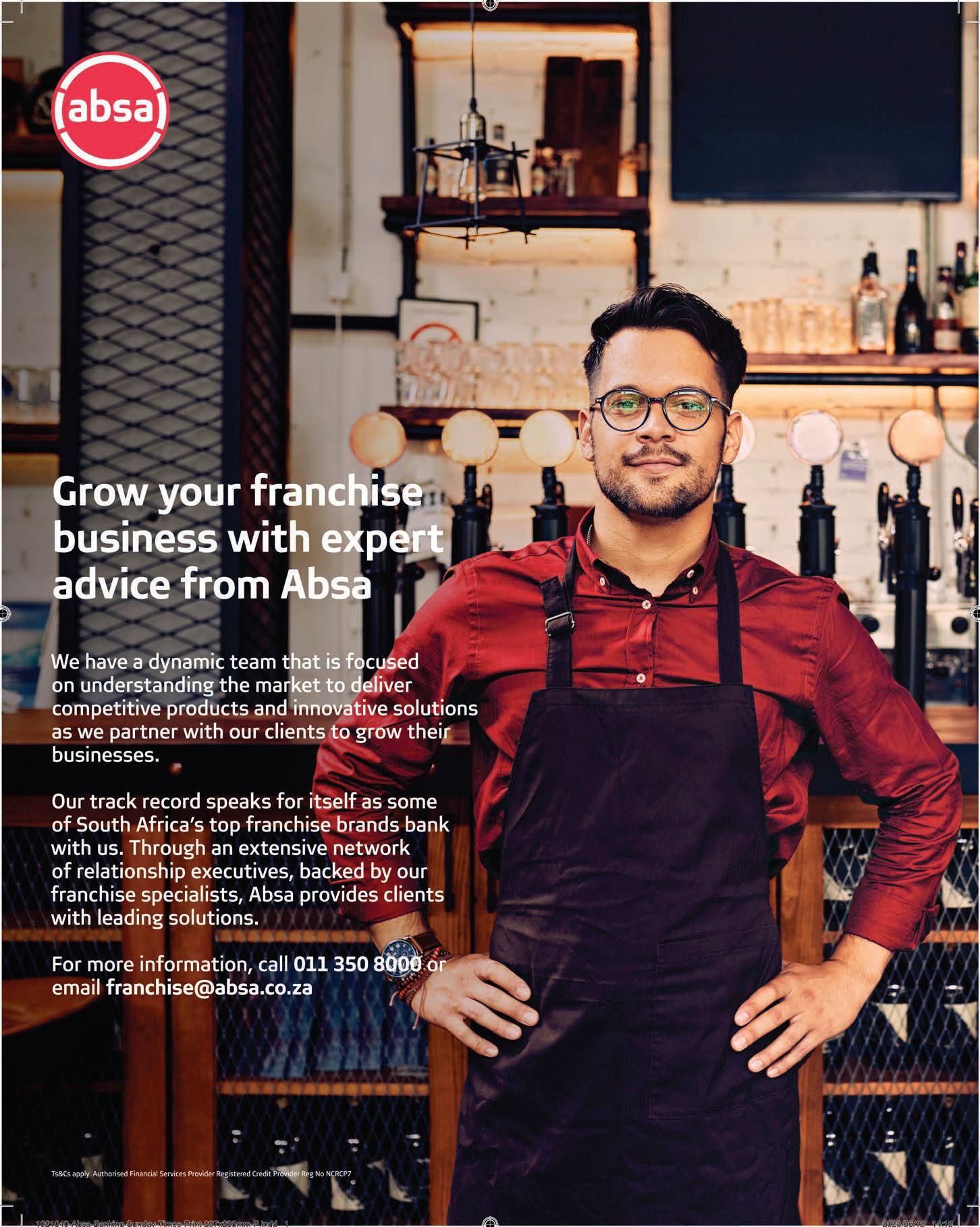


Franchising could be the business format to turn the economy around, writes
JAMES NOBLE , head of wholesale, retail and franchise at Absa Relationship BankingSeveral franchise restaurant brands are reducing rental costs by opting for smaller trading spaces with fewer seats, which could result in signi cant savings for the business. A common trend is also the introduction of drive-through options.
What about the after-market sector? Due to the rising unemployment rate and increases in new vehicle prices, motorists are keeping their vehicles longer and therefore have an increased need for maintenance. This could have a positive in uence on franchises in this sector. The implementation of Right to Repair from July 2021 could also generate opportunities for service centre franchises to grow.
In addition, the service station industry is taking strain due to fuel volumes that are down by nearly 10 per cent for petrol compared to pre-COVID-19 volumes. Diesel volumes, however, are up over ve per cent compared to pre-pandemic volumes. Continued fuel price increases add to the pressure on these businesses, meaning they will have to rely more on alternative opportunities to become pro table again. Alternatively, the industry will have to relook operating expenses and how operations can save by introducing renewable energy solutions such as solar panels to decrease electricity costs. A review of the Regulatory Accounting System should also be considered to ensure that all expenditure is accounted for.
More than three years have passed since COVID-19 rst hit the South African economy. Since the height of the pandemic, certain subsectors of the wholesale, retail and franchise industries have bounced back. Others have taken longer and are still recovering from the impact of COVID-19.
Over the past two years, other factors have also had a signi cant impact on businesses. The ongoing Russia/Ukraine con ict continues to disrupt the value chain, particularly in industries reliant on imports from these countries.
Locally, we’ve also faced political uncertainty, riots and ooding in certain areas, with far-reaching implications for businesses. Load shedding is another post-pandemic challenge affecting most businesses and consumers. The cost to remain open during load shedding, which ranges from six to eleven hours a day, is signi cant. Larger businesses, such as grocery retailers, service stations and
restaurants, spend between R60 000 and R120 000 monthly on fuel for generators to continue operating. This cost comes directly from the bottom line.
The hurdles and challenges facing various business categories in the franchise industry have required these businesses to think outside the box, and become more resilient and smarter at delivering their products and services. Although sales might be up, expenses have risen signi cantly as well, negatively impacting business pro ts. Many retail businesses fast-tracked their e-commerce strategies with online sales platforms where customers can view, order, pay securely and get their goods delivered to their doors on time.
Most of the quick-service restaurants started looking at delivery services, either in-house or through local delivery services, but with an impact on operating costs and a lower bottom line.

Across the economy, consumers are under pressure due to factors such as unemployment, the rising cost of electricity and fuel prices and their knock-on effects on in ation. Businesses are also struggling due to load shedding and consequent reduced trading hours. Therefore, retailers have had to become even more innovative with their loyalty programmes to ensure customer retention and value-add.
South Africa has over 45 000 franchise businesses, creating employment for more than 500 000 people. Franchising is still a safer way of getting into business and becoming nancially independent. The support of a franchisor and the value of brand recognition outweigh the risks of starting a business on your own. Franchisors can assist with lease negotiations, product and supplier arrangements, marketing the business and raising nance and services from the bank at affordable rates to reduce operational costs.
Absa has a good understanding of the industry from a franchisor, franchisee and banking perspective and can provide prospective franchisees with solutions that will contribute to business success.
Many retail businesses fast-tracked their e-commerce strategies with online sales platforms where customers can view, order, pay securely and get their goods delivered to their doors on time.


Thinking of taking the leap and investing in a franchise? CARYN GOOTKIN asks the experts what to consider when becoming a franchisee
Buying a franchise will be one of the largest investments of your life, says Anita du Toit, franchise development consultant and founder of Franchise Fundi. “So, do your research and consider all the aspects that may in uence your new career.”
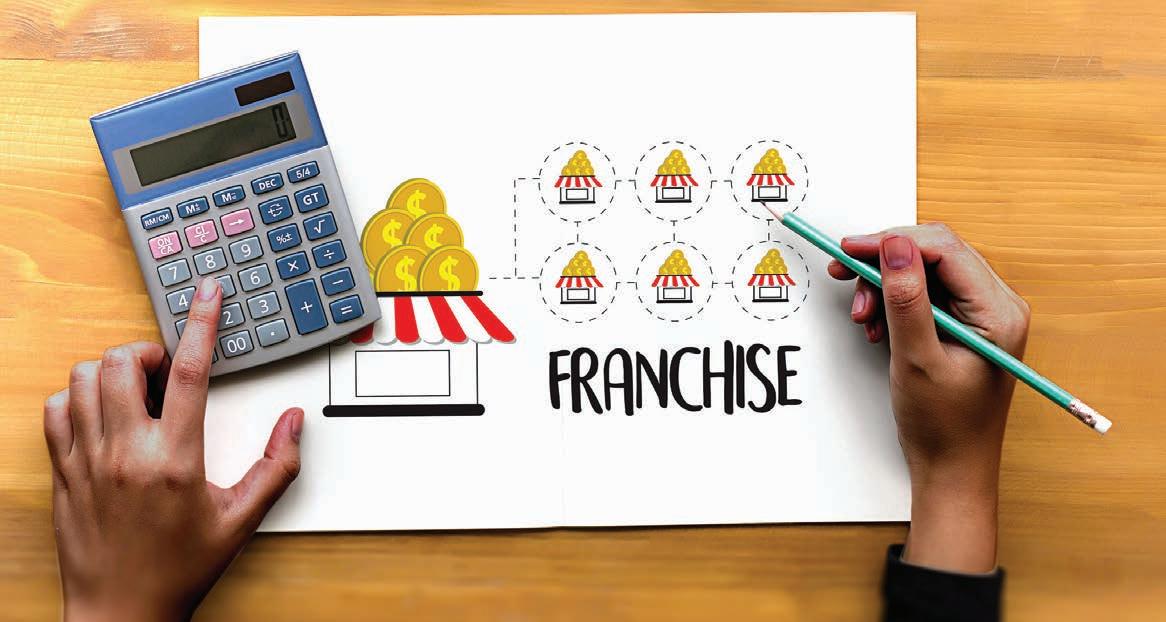
One of the most important things to research is which franchises are in demand. “Franchises in demand are well managed with good relationships between franchisors and franchisees,” says Steven Francis, CEO of Franchising Made Easy. “These businesses are progressive in operations, marketing, human resources, training and product innovation.”
Operating the franchise will become your new job. “This job should be ful lling and enjoyable, so it’s critical to assess the type of work and whether or not it meets your needs,” says du Toit. She advises avoiding opportunities that appear lucrative but don’t suit your work preferences. “Fast-food and restaurant franchises can be cash positive quickly, but the work demands long hours and may not suit someone with a young family. Shadow an existing franchisee to get a sense of what is involved.”
Make sure you have access to suf cient capital. “The initial investment is one of the main factors determining your choice of franchise,” says du Toit. “As a rule of thumb, franchisees should have at least half the initial investment in cash to qualify for bank nancing. Consider the initial investment carefully and ensure the amount includes the total establishment cost in equipment and other expenses, initial fees payable to the franchisor, working capital and a landlord’s deposit.”
 Steven Francis
Steven Francis
Start by aligning your interests, skills and experience to an industry. “Choose a sector you love or are passionate about because you will be running the business full time, says Sasha-Lee de Bod, consultant and partner at Franchising Plus.
De Bod advises prospective franchisees to ask the franchisor for a breakdown of all costs they could incur to open the business.

Franchisors generally offer training on the operation of the business.








“Determine what initial







“THE BUSINESS MUST HAVE A GOOD TRACK RECORD WITH INVESTORS, FRANCHISEES, LANDLORDS, CUSTOMERS AND SUPPLIERS, AS WELL AS SOLID SALES GROWTH.” – STEVEN FRANCIS
The disclosure document must provide the contact information of existing franchisees.


Before committing, chat with existing franchisees to get a feel for their experience with the franchisor. “Ask them about their profitability, how long it took them to recoup their investment, and whether the franchisor is keeping their side of the bargain,” says Anita du Toit of Franchise Fundi. “Get a general sense of the franchisor’s conduct by asking how they handle franchisee illness, whether they welcome suggestions from franchisees and how they handle franchisee grievances.”
Understand how the franchisor handles changes in the marketplace and how quick they are to adapt. “Ask about the ongoing support given to franchisees and the quality of the training, systems and manuals,” says Sasha-Lee de Bod of Franchising Plus.
and ongoing training and support you will receive,” says de Bod. “Ask up front what the training will consist of, how long it will last and whether these costs are included in the upfront fee.”
It is also worth asking existing franchisees in the network whether or not the training available is adequate, adds du Toit.
Franchisors often do a lot of brand marketing, so franchisees should ask if they are expected to contribute to the advertising and promotional costs incurred, says de Bod. “Also check if you are obliged to undertake marketing at your own expense.”
Du Toit says most franchisors offer many marketing guidelines and tools. “However, some franchisees may not be comfortable with advertising, most of which now occurs digitally, so ask the franchisor what help they offer.”
The franchisor is obliged to provide prospective franchisees with a franchise agreement and disclosure document. “You are allowed 14 days to consider the documents before signing,” says du Toit. “Go through
these documents in detail and consider hiring an attorney to explain them to you.”


Francis advises ensuring the franchise agreement is aligned with the lease agreement of the intended premises and that landlord, franchisor and franchisee are all in agreement. “Seek opinion outside the brand if possible to ensure there are no hidden agendas between franchisor and landlord.”
“The business must have a good track record with investors, franchisees, landlords, customers and suppliers, as well as solid sales growth, measured by the number of new outlets opened annually,” says Francis. “Customer and media reviews are another tracking mechanism.”

The legal documents should specify the ongoing fees payable to the franchisor. “Franchise arrangements usually include a monthly royalty or management service fee, which is charged as a percentage of sales,” says du Toit. “The marketing fee may also be charged as a percentage of sales. If the franchisor charges other fees, such as accounting services or IT licences, ensure you understand what these fees entail and that all fees payable are re ected in the nancial projections included in the disclosure document.”
Investigate whether the royalty fee is market-related and what support you will get in return. De Bod says: “You need to be able to work out whether the franchise will give you a satisfactory return on investment and allow you to draw the salary you want.”
Francis notes that the hospitality sector is very popular, as well-managed food brands aligned to the franchise model often result in short-term return on investment and build cash ow much sooner than other franchise sectors. “If the franchisor operates a central distribution that supplies products relevant to the brand,
Prospective franchisees should visit whichfranchise.co.za for a comprehensive resource that offers franchising information and showcases franchise opportunities. Its franchisee self-test is a solid place to start when considering whether buying a franchise is right for you. Take the test at whichfranchise.co.za/about-franchising/ franchisee-self-test/

Many franchises don’t offer business acumen training, which could be critical for a franchisee who has never managed a small business.
“If the franchise doesn’t offer business training, consider equipping yourself with this knowledge by attending a short course on managing a small business or finance for nonfinancial people,” advises Anita du Toit of Franchise Fundi.
establish the process, payment terms and policy if the central distribution is out of stock of what is termed in franchising ‘licensed products’.”
Before investing in a franchise, it is vital to conduct thorough market research to analyse where your competition lies. De Bod suggests asking the franchisor the following:
• Who are the business’s main competitors? What are their respective strengths and weaknesses and how can I outsmart them in my territory?
• What are some of the threats your brand faces in the current marketplace?
• Have any of your franchisees failed in the past, and if so, what were the reasons for these failures?
Some categories are at worst overtraded or at best highly competitive, advises du Toit. “As an example, there are many fast-food chicken franchises in the market. When considering such a franchise, look for what differentiates the franchise you are considering. Ask the franchisor what makes their franchise unique and how they market that uniqueness. The cheapest franchise is not necessarily the best option, so visit competitors to assess what they do differently.”
“CHOOSE A SECTOR YOU LOVE OR ARE PASSIONATE ABOUT BECAUSE YOU WILL BE RUNNING THE BUSINESS FULL TIME.” – SASHA-LEE DE BOD


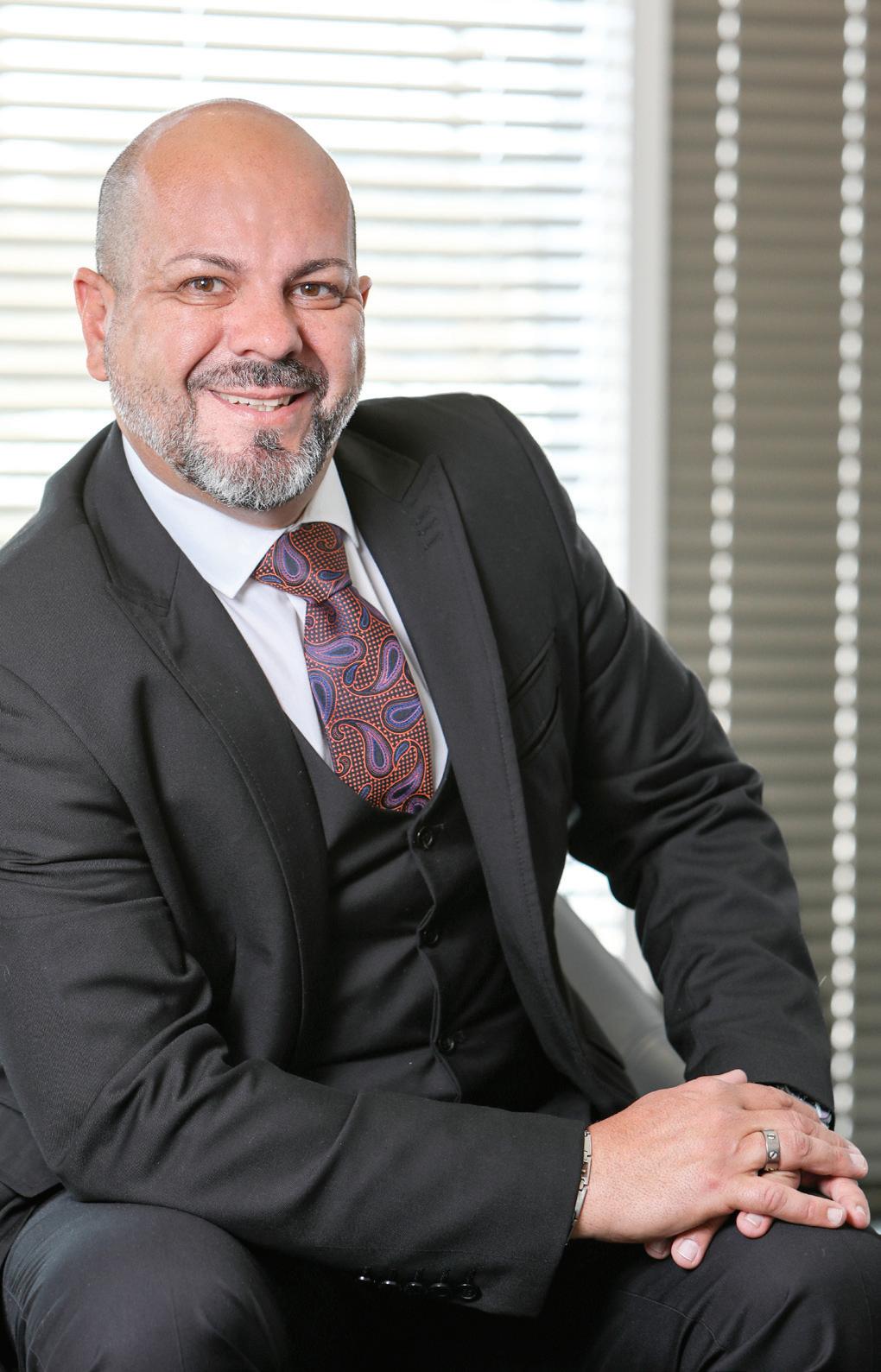
In the bustling landscape of the South African economy, one sector stands out for its incredible potential – franchising. Accounting for a staggering 12% of the national GDP and proudly holding the title of the secondlargest employer after mining, the sector offers a world of investment opportunities for visionary entrepreneurs. With over 800 registered brands of which an impressive 90% are homegrown, the South African franchising industry is firmly rooted in the hearts and minds of its people.
Andre Beck, Head of Franchising at Standard Bank, acknowledges this, stating, “The strength and enduring popularity of local brands make operating a South African brand franchise a compelling business proposition.”
While the franchising sector offers tremendous opportunities, South African businesses have also been grappling with a power crisis that has impacted operations. Power is critical to any business, but franchise businesses are particularly impacted by interruptions in the power supply. The challenge lies in rescheduling operations and staffing around scheduled power outages, which inevitably has a negative impact on revenue. Businesses that rely on constant power, such as refrigeration, cooking equipment, and fuel industry operations, suffer from the constant strain. The high cost of installing generators, rooftop solar systems, and ongoing fuel and maintenance expenses further erode business profits, cashflow, economic growth, and the cost of the final product.

To address these challenges Standard Bank has taken proactive steps to support businesses in the franchise sector. “The bank has been engaging with franchisors, franchisees, landlords, and suppliers to understand the impacts of power outages and develop effective solutions and funding packages that will alleviate the pressures. It has financed several projects in various formats, ranging from grid-tied solar systems to fully integrated systems with backup power. Offers packaged asset finance solutions to cater for the diverse alternative energy needs of clients, and for more complex requirements, structured funding solutions can be tailored accordingly. The aim is to provide solutions that
truly address the challenges faced by clients, acknowledging that a one-size-fits-all approach doesn’t always work”, says Beck.
Over the years, Standard Bank has learnt that clients often struggle to navigate the fragmented environment of renewable energy solutions. To simplify the process and empower clients to make well-informed decisions, the bank introduced two distinct platforms. PowerPulse, specifically designed for commercial clients, serves as a connecting platform that links these clients with credible operators in the renewable energy market. It enables commercial businesses to explore and implement suitable renewable energy solutions. On the other hand, LookSee, a comprehensive one-stop shop, which caters to homeowners and small to medium-sized businesses seeking to enhance cost-efficiency and optimise energy usage in their properties. It provides tailored solutions to help these clients save money and achieve greater energy efficiency. Additionally, the bank’s teams also stay closely connected to the value chain, engaging with industry and regulatory bodies to support the industry’s growth and facilitate a smooth transition to alternative energy solutions.
Standard Bank’s focus is fi rmly set on keeping businesses in business. Their dedicated franchise sector proposition boasts a team of specialists and a relationship manager, giving personalised attention to clients. The integrated digital platform instantly connects franchise professionals with a vast network of relationships, providers, supply chains, and fi nancial and professional solutions. The bank also leverages its banking expertise and insights to help clients make and save money as they grow. In addition, it offers merchant solutions to further support businesses expansion.

By nurturing deep relationships with individual clients, the bank gains a comprehensive understanding of their businesses and funding needs. Applying an ecosystem thinking approach, franchise relationship managers help clients to access the right capabilities, insights, tools, and relationships for growth. Standard Bank’s franchise sector proposition extends its reach across key franchising sectors as well as agriculture, construction,
logistics, energy, fi nance, legal, and accounting, enabling clients to tap into a vast universe of skills, products, and solutions. However, the true secret behind Standard Bank’s franchise sector proposition lies in relationships. By working closely with franchisees and franchisors, the bank can navigate challenges and adapt business models and offerings in response to new insights, data, and operating conditions.
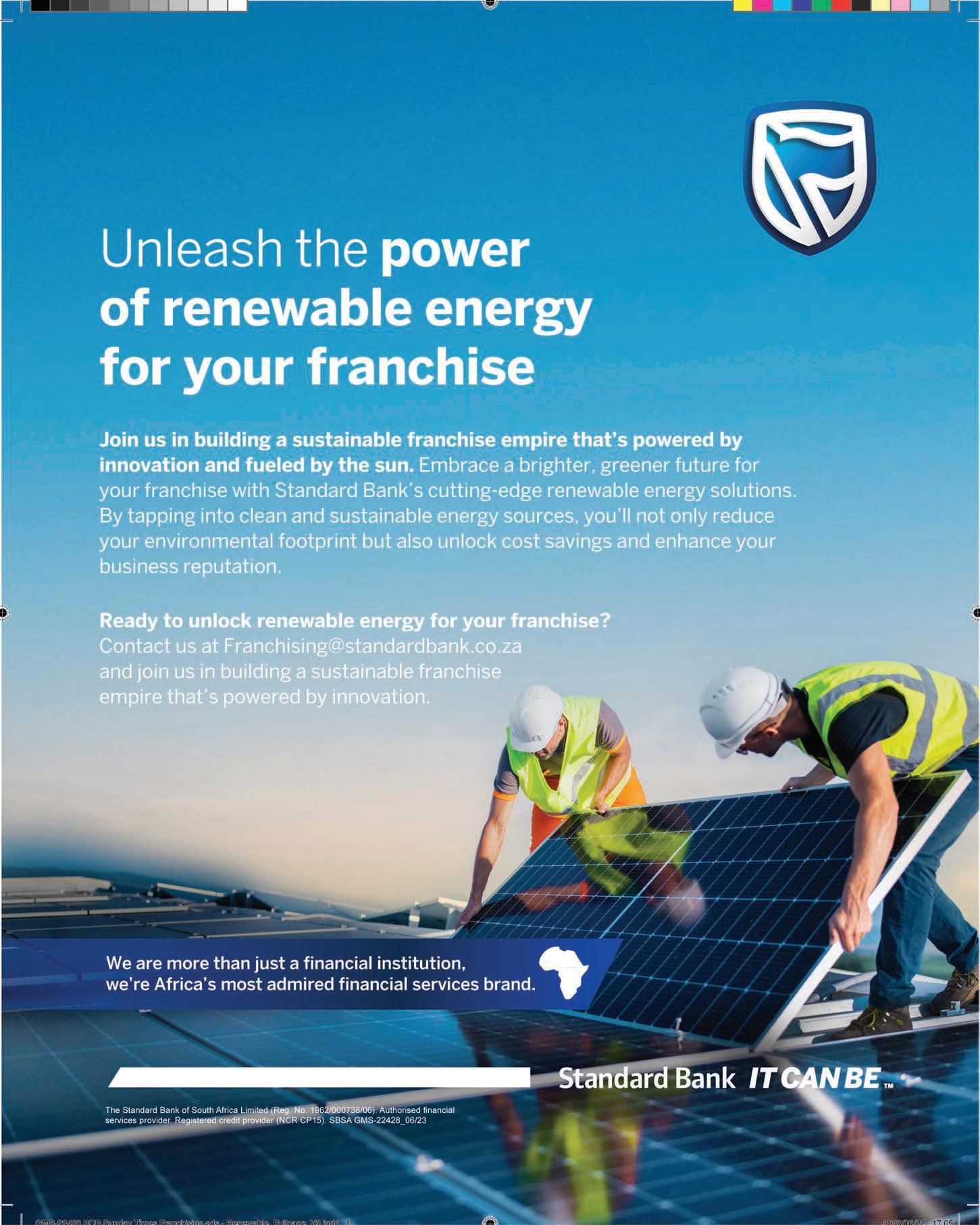

Companies making their mark in the fourth industrial revolution are those that understand value drivers such as data, artificial intelligence, machine learning, digitisation and e-commerce – and South African franchises are no different.
By KAREN KEYLOCK , national franchise head at Nedbank Commercial BankingRecent information released by Mobicred reveals that online shopping in South Africa grew by 40 per cent last year. Interestingly, the age group 60-plus, which was averse to online shopping at rst, has grown by a staggering 90 per cent, and experts predict that over the next decade, e-commerce will become the number-one driver of business growth.

This indicates that franchisors and franchisees can no longer rely on traditional, business-as-usual ways to conduct business. Instead of seeing e-commerce as a threat, brands should look at the opportunities it presents and consider alternative delivery options, quicker turnaround times, slick exchange and return policies and, most importantly, accurate knowledge of stock availability to succeed.
With COVID-19 signi cantly accelerating e-commerce adoption globally, South African franchises are also focusing on building their digital presence. But how can business owners ensure their franchise will succeed on this digital journey?

Digital technology has enabled a rapid rise in e-commerce and alternative delivery models, and businesses that have been quick to adapt and evolve have been the most successful during this transition. Businesses in the midst of transitioning must bear in mind that digital tools have to be adopted in a way that will ensure customers continue to enjoy the great experience they associate with the brand and receive expert support when they need it. Now more than ever, online customer experience
can make or break a brand or retail outlet. So, it’s essential that all the elements work together and complement each other and that ordering services are streamlined and easy to navigate.
A Deloitte report, Digital Commerce Acceleration: Increased online purchases present new opportunities for digital commerce players, identi es several key factors that matter most to consumers when it comes to online shopping, including affordable delivery fees, clear returns and refunds policies, a smooth checkout experience and data protection. Each of these should form part of the foundation of any digital commerce offering entering the South African market.
Besides e-commerce, many other available digital innovations can make a big difference at franchisor and franchisee level. These include digital marketing tools and advertising techniques, such as geofencing, that stretch your marketing budget, and loyalty and ordering apps to cut down waiting time, increase revenue growth and expand the size of your market and customer base. Modern customer relationship management systems

Not every franchisor or franchisee may be able to invest in a costly e-commerce store. That is why platform economies, such as Avo by Nedbank, which allows one to cut right to the chase of selling products and accepting payments online, are so appealing. These platforms bring consumers and businesses together without the hassle and costs of e-commerce stores.
Avo accurately matches consumers’ lifestyle needs to product and service offerings through powerful artificial intelligence, enables safe and secure payments backed by bank-grade security and has the power to sell into the homes of millions of citizens.
make franchisee recruitment faster and more effective, while arti cial intelligence, including facial recognition of employees and customers, can analyse customer shopping patterns and identify members of loyalty programmes to offer them tailored promotions. Innovative new payment methods, such as contactless cards and mobile payments, speed up and streamline payment processes. Security is ensured by next-generation rewalls and cybersecurity strategies, which protect point-of-sale, website and back-of ce systems from hackers.
The list of digital innovations and how they can bene t your franchise is endless – and constantly changing. What doesn’t change is the need to accelerate the pace of innovation to gain a competitive advantage. Fortunately, there are valuable partners that you can leverage for support, advice and expertise, and existing innovations to leap into the digital innovation space.
DIGITAL INNOVATIONS CAN MAKE A BIG DIFFERENCE AT FRANCHISOR AND FRANCHISEE LEVEL. THESE INCLUDE DIGITAL MARKETING TOOLS AND ADVERTISING TECHNIQUES, SUCH AS GEOFENCING, THAT STRETCH YOUR MARKETING BUDGET.
The Franchise Association of South Africa (FASA) has, for the past 44 years, overseen the establishment and growth of the franchise sector, which contributes extensively across 14 business sectors to the country’s economy. We cannot allow growth in our sector to regress or slow down as the future of South Africa relies on a vibrant sector such as ours to provide the entrepreneurial spark that creates new businesses, provides employment and caters to the needs of the population. Now, more than ever, franchising needs to hold its own, take the road to recovery and continue to play the important role it does in contributing to the country’s economy.
“The franchise sector in South Africa has been going since the 1960s and through sociopolitical and economic hardships has continued to grow, contributing around 14 per cent to the country’s gross domestic product. It has been the catalyst for encouraging entrepreneurship, skills development and job creation for thousands of people across more than 14 business sectors. All that is at risk of regressing if the operating environment is not conducive to doing business – at the moment it is not, and if not addressed could spell the demise of all the hard work that has gone into one of the most vibrant of business sectors.”
“Rising interest rates, incredibly high food in ation and unprecedented levels of load shedding have added to the woes of an already economically distressed consumer. Roman’s Pizza’s focus on delivering a superior value offering of incredible pizzas, salads and pastas has allowed our stores to grow revenue in these challenging times. We believe that the fast food sector will continue to prove to be more resilient than other sectors in the 12 months ahead. We will continue to innovate in these challenging times to ensure that we always offer the consumer the best value proposition.”
John Nicolakakis, CEO, Romans Pizza

“There is no doubt it’s going to be a tough year for most businesses in South Africa as we are all having to endure the burden of extra expenses to stay relevant and pro table. However, thanks to franchising’s power of ‘the collective’ and the resilience of the industry and our sector’s ability to maintain a positive attitude, we hopefully can ride this out and continue trading and expanding for the bene t of the country’s economy. With OBC’s store sales well above average growth and in ation, we strive to ll consumer tables with excellent value for money and continue to contribute and be part of the social fabric of our society.”
 Tony Da Fonseca, MD, OBC Better Butchery
Tony Da Fonseca, MD, OBC Better Butchery

“As much as franchising is a resilient sector and a great recipe for a business, external forces such as continued power cuts create additional pressures as the costs of running alternative power are funded straight from the bottom line. For most franchisors that continue to succeed against the odds, however, not having alternative power is also not an option. While many have made alternate plans, we need a plan of action from government with clear milestones, deliverables and a commitment to end the power crisis.”
Richard Mukheibir, MD, Cash Converters













“Even with the signi cant loss of income during the pandemic years, A+Students recognised its responsibility as educators and adapted its business model to include online classes, ensuring that children would still get the optimum tutoring and that our franchisees could continue to educate and ‘grow one child at a time’. Many of our franchisees have doubled their turnovers this past year under our franchise umbrella, which provides ongoing support through innovative campaigns that continue A+Students’ growth and success.”
Marlene Mouton, Founder, A+Students“While the effects of the pandemic and the resulting decline in business could not be avoided and its impact still lingers, the past year has carried with it a hope and sense of normalcy for Legends Barbershop and the hair grooming industry as a whole. As a franchise group, we acted and soldiered on with our planned post-recovery initiatives. Our future plans include increasing our Legendary footprint from its current over 70 stores to 169 stores in 2025 with the help of our corporate team, franchisees and our loyal customers.”
 Sheldon Tatchell, Founder, Legends Barbershop
Sheldon Tatchell, Founder, Legends Barbershop

“PostNet is a franchise that has been trading in South Africa for 29 years. Thankfully, we have a strong brand with loyal customers. Our franchisees are committed and follow our business model. As a business, we are very aware of the challenges we face daily. Load shedding has negatively affected our country’s economy. Our franchisees have had to invest in infrastructure to ensure we can keep the doors open and serve our customers. In these challenging times, we have to have the right mindset to ensure we sustain our growth and pro tability.”
“The challenge of keeping doors open during these hard times remains a constant worry to businesses – large and small –but in the context of franchising, if the franchisor adopts the right approach to restructuring and reinforcing its core business for the bene t of his existing and future franchisees, that problem can become a shared one. The aim must be to curb expenses, improve ef ciencies and streamline processes to counteract the negative impact on pro tability. Embracing change to avoid being left behind is the key to surviving and staying ahead of the pack.”
Eric Parker, Director, Franchising Plus



“The one factor that unites franchising globally is its determination to overcome the obstacles it faces and nd the opportunities among the adversities. Its business format allows it to balance the scales of supply and demand, innovate enough to change course and use its collective power to weather the storms and grow. Recognise us ... and the role we can play in rebuilding the economy! That is the message FASA and the franchise community want to send to government. If we all work together to build an inclusive economy that stimulates business opportunities, in turn creating jobs, South
Africa can recover and prosper.”“South African small and medium enterprises (SME’s) have demonstrated impressive resilience despite unexpected challenges with a few interesting franchising developments and an uptick in nance applications from new entrepreneurs. Fuelled by the gaps left after a prolonged global pandemic, new concepts have emerged in sectors such as the rapidly growing e-commerce space, education, home services and off-grid solutions, which open the door to franchising installers of solar. Absa continues to support the SME sector as it plays a vital role in enabling job creation and boosting economic growth.”
James Noble, Head of Wholesale, Retail and Franchise at Absa Relationship Banking





For more information:
+27 11 615 0359
enquiries@fasa.co.za
www.fasa.co.za


The FRANCHISE ASSOCIATION OF SOUTH AFRICA shares that it is conducting a survey of the sector, particularly focused on how franchisors and franchisees have coped with the multitude of challenges faced over the past four years

The Franchise Association of South Africa (FASA), in association with Absa, is embarking on a definitive industry survey after a break of four years. By looking at the events of the past four gruelling years, which included the debilitating effects of the COVID-19 lockdown regulations, flooding, the July 2021 riots and looting, political turmoil and economic strain, FASA hopes to get a clear indication of the challenges franchisors and franchisees faced and, more importantly, what lies ahead for the future of this important sector.
The 2019 FASA Franchise Survey showed that while the industry was taking strain due to the slowing economy, franchising contributed 13.9 per cent (R734-billion) to the country’s gross domestic product (GDP) through its 813 franchise systems and its 47 923 outlets, and employed, directly and indirectly, almost 500 000 people. It showed a solid performance despite tough economic conditions and was a testament to the tenacity of this unique business format.
There is no question that businesses across the board, big and small, including franchises, were hit hard by the snowball effect started by COVID-19 and affected by so many other sociopolitical and economic factors since then. By and large, the franchise sector has, through these trying times and in line with global trends, relied on the strength of the collective, made up of franchisors and franchisees, all tackling problems and finding solutions together.
“FASA has, for the past 44 years, overseen the establishment and growth of this vital sector,” says Fred Makgato, FASA CEO. “We cannot allow growth in our sector to regress or slow down as the future of South Africa relies on a vibrant sector such as ours that encourages entrepreneurship, plays a role in skills transfer and job creation. Now, more than ever, franchising needs to hold its own, take the road to recovery and continue to play the important role it does in the country’s economy.”
Thanks to sponsorship from Absa and the commitment of its franchise division, FASA has commissioned Research EQ to conduct the survey under the capable direction of Margaret Constantaras, head: quantitative research and governance, who has a particular interest in
franchising as she is completing her PhD in this field. “Since our involvement in FASA’s surveys of the sector since 2014, we will be devoting a good portion of the survey to how franchisors and franchisees coped during what was probably the most trying four years in business and identify their strengths and weaknesses,” Constantaras says.
The surveys will focus on:
• The Franchisor Survey will track the franchise trajectory in South Africa over the past four years, whether it is upholding its contribution to GDP, assessing any losses it may have incurred during the past turbulent years in terms of drop in revenue, operating/ closure of stores, creation of employment and clarification of key franchise practices.



• The Franchisee Satisfaction Survey will measure the temperature of the franchisees at the coalface of the economy and is critical to the health of small businesses within the economy. This includes an analysis of how franchisees coped in the difficult trading environment and whether they are getting the necessary support from their franchisors. “Both these surveys are important,” says Constantaras, “not only within the context of where franchising sits in its contribution to GDP, but also as an analysis of how COVID-19 and the lockdown regulations and other economic and political events impacted the sector. As franchising operates in the entrepreneurial space, offering business opportunities, it is important for franchising and FASA’s long-term growth strategy.”
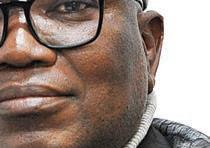
James Noble, head of wholesale, retail and franchise at Absa Relationship Banking, has been involved in the franchise sector and FASA for over 20 years. He says playing a part in tracking the franchise sector’s growth by sponsoring the surveys is crucial for the future of this vital sector. “Franchising is in the national interest as it is a business model that makes a meaningful contribution towards solving one
of South Africa’s most pressing challenges –job creation. We recognise the vital role the franchise sector plays in creating wealth and employment opportunities in South Africa. By sponsoring and facilitating this survey, we will be in a better position to understand the market dynamics and the environment in which our clients operate. We will also be able to identify the challenges franchisors and franchisees face, offer innovative solutions and deliver competitive products that will meet their future needs and support their growth objectives.”
Absa’s sponsorship of FASA’s survey into the state of franchising comes on the back of encouraging movements in the lending environment that point to new opportunities in the wholesale and retail sectors, along with interesting franchise entrants. Noble confirms that the bank has seen an uptick in finance applications. “You do go through cycles where there are more and then again fewer applications, but in recent months we have seen a lot of new entrepreneurs applying for finance,” he says.
Constantaras agrees and indicates that the preliminary findings on the interviews completed thus far with franchisors are demonstrating the franchise industry’s resilience. On average, four new franchise outlets were signed up in the previous year. Furthermore, there are strong indications of expanding into other countries in the upcoming financial year.


blackouts on profitability and productivity, along with inflation and ever-increasing costs. To navigate the uncertain economic landscape, strategies, such as finding innovative ways to remain relevant, providing extensive support to their franchisees and exploring alternative power options such as generators, inverters and solar energy to keep business running and costs manageable, are being implemented.
The disruptive events of the past three years have had a profound effect on franchisors’ perceptions of their business status with a noticeable increase in businesses considered to be in the turbulent stages of adjustment and change. Conversely, the stable stage of establishing and maintaining, the ambitious stage of expansion and risk-taking, and the mature stage of control and profit have experienced decreases. There is a high level of optimism, however, regarding revenue growth in the next financial year for businesses.
“FASA’s success on the world stage and as a longtime member of the World Franchise Council makes it all the more significant that we keep tabs on the growth of the franchise system within South Africa as it is the most significant franchise market in Africa,” says Maria D’Amico, chair of the Franchise Association.
“We hope the surveys will help identify growth areas in the many sectors of business that can be franchised – from mentoring fledgling township entrepreneurs to become established and ethical operators to encouraging large corporate brands to consider converting their company stores to franchised stores as a more economical and profitable option, and encouraging other operations to consider going the franchise route if their business system is capable of being franchised. But we need government to also play its part and commit to facilitating the business environment, making sure that business can operate effectively and efficiently.”
FASA’s Franchise Surveys will be conducted from June to August this year with franchisors and franchisees across the 14 different business sectors participating in one-on-one, telephonic and online interviews. The results of the survey will form part of FASA’s Franchise Conference to be held in mid-October.

Scan this QR code to go directly to the FASA website.
 Freddy Makgato
Freddy Makgato
The main challenges facing franchisors are perceived to be the impact of the rolling

For more information: +27 11 615 0359 enquiries@fasa.co.za www.fasa.co.za

“FRANCHISING NEEDS TO HOLD ITS OWN, TAKE THE ROAD TO RECOVERY AND CONTINUE TO PLAY THE IMPORTANT ROLE IT DOES IN THE COUNTRY’S ECONOMY.” – FRED MAKGATO





Novi Global is a truly global recruitment business, operating in 25 countries and offering opportunities around the world. We offer franchisees the opportunity to run a exible business, working the hours they choose and in any time zone they like.
Many franchisees work a few hours after their current job, perhaps in the United States or New Zealand markets. Some work full time and are looking to build a big business – the possibilities are endless for anyone looking to join. Our Bulgaria of ce has been operating for nearly eight years and the team of seven is doing extremely well, which shows the opportunities are there if building a big business is something you want to achieve.
Starting a business from scratch can be very expensive, challenging and risky, so joining a franchise business established for more than nine years means you receive unlimited support, help, training and, in our case, many jobs from day one in many different sectors.
In South Africa, we have franchisees from Cape Town to Durban and in between. Our country manager, Gavin Swanepoel, is a seasoned business leader who has been with us for nearly two years and is a valuable team member. He provides insight and guidance for other franchisees and often shares the jobs he gets with others.

A great feature of the franchise is that we work as a team, all helping each other with jobs or candidates, so you never feel you’re alone.
We provide all the tools you need, the backof ce infrastructure, email, database, website, job boards and jobs.

We also invoice from Gibraltar in Europe, so there is no sales tax on any invoice, a great unique selling point, and you don’t even need to register a business as we do the invoicing on your behalf. The only essential extras would be phone calls and LinkedIn Premium (most of us use Sales Navigator, cost-effective and very useful when combined with the searching methods we use).
We also have jobs within major blue-chip companies that you can work on from day one, so whether you want to work the full life cycle, just provide candidates, or use your connections to get clients on board and then let the rest of the team provide candidates for you, the opportunity is there.

“I have been with Novi Global since October 2021, and I couldn’t have chosen a better franchise.



“What I like most about the franchise is that it allows me to operate and recruit not only in my country, but internationally as well, especially regarding my huge network. I am not restricted and limited to one region only, I can work anywhere in the world if I choose to do so.
“The onboarding process with Ben was very professionall and the training is exceptional. The step-by-step approach helped me to ease into the business of recruiting almost immediately.
“The training tools and documentation at my disposal are professionally set out. If I require any information or need to adjust contracts to suit my clients, Ben is always available, ready to assist and guide me through the process – his support is phenomenal.
“The investment that I made in the Novi Global franchise has already paid off, like every business, ‘what you put in, you get out’. The support I receive from Ben makes it that much easier, and it gives me confidence knowing that I have excellent backup whenever I need it.
“I would recommend Novi Global as a good business opportunity and a great investment.”
For more information:
Please send your CV to ben.co eld@noviglobal.com and let me know why you are interested in joining. I’ll be happy to schedule a call with you. www.noviglobal.com

South Africa’s food franchises are making their mark overseas, writes
ORESTI PATRICIOS, CEO of OrnicoSouth Africa’s restaurants and fast-food franchises faced signi cant challenges during the pandemic, compounded by now-persistent load shedding. Despite these obstacles, the sector thrives, with several local franchises making a mark in overseas markets. Their success lies in their ability to tailor their menus to local preferences while retaining the distinct avour pro les and warm South African experiences that characterise their brands.
We explore some of these fast-food franchises and examine how they are conquering global markets while staying true to their South African roots.

First on the list is Nando’s, a renowned South African peri-peri chicken chain that has achieved remarkable success abroad. The brand has expanded to over 30 countries, including the United Kingdom (UK), Australia and the United States. Nando’s has cleverly adjusted its menu to cater to local preferences while maintaining its signature peri-peri avour. In the UK, for example, Nando’s offers a wider variety of vegetarian and vegan options to meet the growing demand for plant-based diets. The store ambience and brand identity remain consistent across all locations, with restaurants emulating a high-quality “family-feel” dining experience. Stores proudly showcase artwork commissioned from South African artists, which helps create a cohesive theme and fosters a sense of familiarity and loyalty among customers.
Spur Steak Ranches represent another South African success story. This beloved family-friendly restaurant chain has expanded its presence to various countries, including Eswatini, Australia and Mauritius. While Spur has accommodated local tastes, its
commitment to providing a welcoming and inclusive atmosphere remains unwavering. The chain has introduced vegetarian and vegan options without compromising its signature grilled meats. Its welcoming feel and brand identity embody the warmth and inviting nature synonymous with Spur’s South African outlets.
Steers, the popular South African fast-food chain specialising in ame-grilled burgers, has made impressive strides in foreign markets. The franchise has successfully expanded to countries such as Zimbabwe, Kenya and Mauritius. Steers understands the importance of tailoring its offerings to local tastes while preserving its core menu. In Zimbabwe, for example, Steers introduced sadza, a traditional staple food, as a side-dish option, catering to local preferences and integrating elements of the local culture. The interior and branding in the store re ect its South African roots, providing an authentic customer experience.
Debonairs Pizza has also achieved notable success internationally. With outlets in
Pizza has adapted its menu to suit local preferences. In Namibia, the franchise introduced a pizza topped with biltong, a popular dried meat snack in the country. Debonairs Pizza ensures a consistent and familiar experience for customers abroad, allowing them to feel the same sense of familiarity as they would in South Africa.
Ocean Basket, another renowned South African seafood franchise, has made signi cant strides in the international market. With a strong focus on seafood, Ocean Basket has expanded to countries known for their love of seafood, such as the United Arab Emirates, Cyprus, the UK and Saudi Arabia. The franchise’s ability to adapt its menu to incorporate local seafood favourites and avours has contributed to its success. In the United Arab Emirates, for instance, Ocean Basket offers a wide selection of Arabian Gulf seafood delicacies, catering for the tastes of the people in the region. This localised approach ensures that customers abroad can savour the avours they are familiar with and enjoy.
Ocean Basket maintains a consistent in-store experience and brand identity that captures the essence of its South African origins. With nautical decor, vibrant colours, and a relaxed dining experience, Ocean Basket creates an atmosphere that transports diners to the coastal regions.
South African restaurants and fast-food franchises have shown remarkable resilience and adaptability in these foreign markets. These franchises have established successful ventures abroad by understanding and catering to local tastes while preserving their ethos.
THEIR SUCCESS LIES IN THEIR ABILITY TO TAILOR THEIR MENUS TO LOCAL PREFERENCES WHILE RETAINING THE DISTINCT FLAVOUR PROFILES AND WARM SOUTH AFRICAN EXPERIENCES THAT CHARACTERISE THEIR BRANDS.


The great resignation is more muted in South Africa than elsewhere on the globe, but it has still seen people embracing new opportunities –such as franchising.
By TREVOR CRIGHTONMore than 47 million North Americans walked out of their jobs in 2021 –an unprecedented wave of mass resignations, according to the US Bureau of Labor Statistics. The trend isn’t gaining quite the same momentum in South Africa – which is no surprise, given our 42.4 per cent unemployment rate as reported in Stats SA’s Q1 2023 Labour Force survey, which also notes that 4.9 million youths are unemployed.
Nevertheless, in 2020, local staff turnover rose to 18 per cent from an average of 10 per cent – though this was due more to retrenchments and job losses than resignations, according to an article on EB Net. It stabilised to 10 per cent again in 2021 – but nearly 40 per cent of those were due to resignations, marking a turn in the tide.
That said, those resignations are largely in highly skilled or specialised positions, with
the average South African unable to simply walk away from a job in a market with limited opportunities. Many who have left their corporate jobs to “go it alone” have turned to franchising as an option – entrepreneurship with a kind of safety net – and this is good news for the economy, as they will create employment opportunities.
Franchising development consultant Eric Parker says a major problem in the local labour market is that there are too many job seekers and not enough job creators. “We don’t encourage or support entrepreneurship enough,” he ventures, adding: “Entrepreneurs also aren’t taught; they’re born.”
Hans van Loggerenberg, franchisee at Cash Converters Woodmead, bought into the concept after exiting the corporate world. “Pre- COVID, and then, through the course
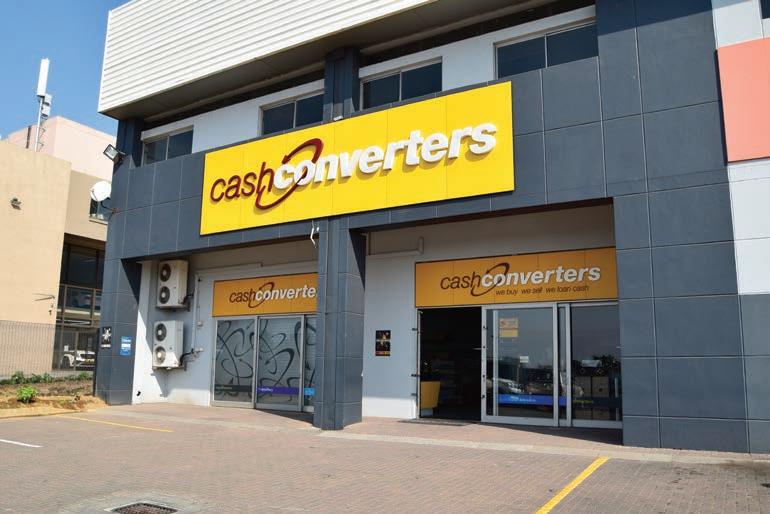
Mature professionals or those with years of practical business and corporate experience are turning their attention to franchising as alternative employment.
The great resignation hasn’t worked out for everyone: a survey of 2 500 workers by employment search site The Muse showed that 72 per cent experienced either surprise or regret that the new position or new company they left their job for turned out to be “very different” from what they were led to believe. Nearly half of these workers said they would attempt to get their old jobs back.
of the pandemic, the economic climate was shifting signi cantly,” he recalls. “After reviewing all my options, including staying in the corporate world, starting my own business, or buying into the safety net of a franchise ‘recipe’, I concluded that the systems, support and structure offered by franchising made it a no-brainer investment.”
Cash Converters group marketing manager Nicole Thomson says many new additions to the brand’s network in the last 18 months are mid- or senior-career professionals. “They’ve looked at the landscape and decided they cannot afford or don’t want to retire at 65 – and that they want a business their children can walk into.”
Parker says that his consultancy, Franchise Plus, has seen an increase in enquiries from “more quali ed” people since COVID-19 struck. This indicates that mature professionals or those with years of practical business and corporate experience are turning their attention to franchising as alternative employment.
He advises anyone exploring this option to do their homework. “There are plenty of franchise opportunities out there, but not all of them are worth your investment. Pick a brand that’s up and coming and has all their ducks in a row, so you can get in on the ground oor, have your pick of locations and get a good start. Since you’re likely putting your life savings at risk, get disclosure documents, visit other franchises and talk to franchisees about their experience – and take your time before committing.”
Thomson adds: “We are starting to see things calming down in our network. There has de nitely been uneasiness with the broader economy; load shedding has not helped con dence in the country, and there was a huge amount of talk about emigrating. In the last two or three months, though, our trade has picked up and overall gures are up 30–40 per cent year-on-year, so there is a compelling reason to buy into Cash Converters.”

